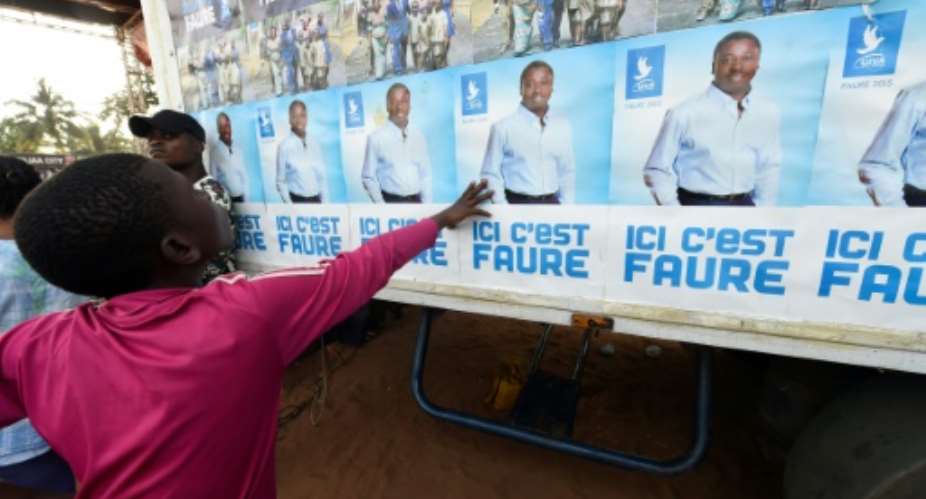Togo's opposition demanded the withdrawal of a contested constitutional reform on Thursday after the government delayed this month's legislative elections to give lawmakers more time to review the amendment.
The reform allowing the National Assembly to elect the president directly triggered opposition fears over attempts to keep President Faure Gnassingbe in power longer.
Togo's presidency late on Wednesday announced more consultations were needed and suspended the April 20 legislative and regional elections without giving a new date.
After a week of political tensions over the constitutional amendment, Gnassingbe had already sent the law back to parliament for a second reading.
"The Togolese are angry and they want this constitutional bill to be withdrawn altogether. Otherwise they are creating disorder," said Nathaniel Olympio, head of the opposition Party of the Togolese.
"This time, this constitutional coup will not pass... This time the Togolese people will stand up and say 'no'."
The dispute has fuelled debate over the rule of Gnassingbe, who has been in power since 2005 after succeeding his father who himself governed for three decades after a coup in the West African state.
Togo's parliamentary elections had been delayed before, with the opposition claiming the assembly dominated by Gnassingbe's ruling UNIR party had lost its mandate because of the lack of a vote.
The constitutional reform has already sparked tensions, with police breaking up a recent opposition press conference and a group of influential figures calling for protests.
"The regime has not understood that the Togolese are protective of their sovereignty and that they do not accept having their right to choose who will govern them taken away," Brigitte Adjamagbo-Johnson, coordinator of the DMP which groups opposition parties and civil society organisations, told AFP.
Togo's minister for civil service Gilbert Bawara told local radio the consultations were needed before the vote to ensure transparency about the reform.
"I believe that it is logical and out of respect for the candidates, out of respect for the Togolese people, out of respect for the voters, that they know the rules of the game before going to the competition," he said.
Togo's delayed election came as West Africa struggles with the fallout from a series of military coups, while Senegal last month generated hope for the region by electing a youthful newcomer to the presidency.
Togo's parliament in March adopted the law that would switch from a presidential to a parliamentary system, handing the assembly the power to elect the president for a single six-year term.
Assembly members would elect the president "without debate", according to the new constitution. But it was not clear whether the president could run for another term.
In 2019, members of parliament revised the constitution to limit presidential terms to two, but it did not apply retrospectively, allowing Gnassingbe to stand for the next two elections.





 Glovo to abandon operations in 'hot' Ghana May 10
Glovo to abandon operations in 'hot' Ghana May 10
 Join me in another ‘dumsor’ vigil, I can’t do it alone – Yvonne Nelson to Ghanai...
Join me in another ‘dumsor’ vigil, I can’t do it alone – Yvonne Nelson to Ghanai...
 Ejisu by-election: Voting underway
Ejisu by-election: Voting underway
 Upper East: Dry Dorongo Dam leaves farmers in despair
Upper East: Dry Dorongo Dam leaves farmers in despair
 Local Govt Ministry to sanction MMDAs for failing to implement GARID projects
Local Govt Ministry to sanction MMDAs for failing to implement GARID projects
 Grave diggers demand proper lighting system to save Tafo cemetery
Grave diggers demand proper lighting system to save Tafo cemetery
 Ejisu by-election: 106,816 voters are expected to cast their ballots today
Ejisu by-election: 106,816 voters are expected to cast their ballots today
 A/R: Tragic highway accident claims 3 lives, one other person injured
A/R: Tragic highway accident claims 3 lives, one other person injured
 ‘No surgeries were cancelled at our facility due to Dumsor’ — Korle Bu Teaching ...
‘No surgeries were cancelled at our facility due to Dumsor’ — Korle Bu Teaching ...
 Glovo delivery site to cease operations in Ghana on May 10
Glovo delivery site to cease operations in Ghana on May 10
